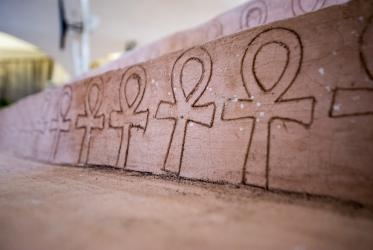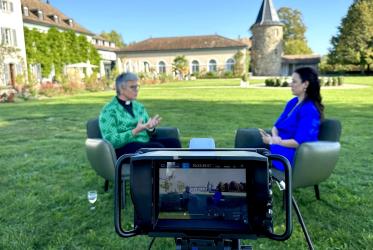Indeed, we hear about horrible wars happening across the globe, political and social unrest, economic crises, environmental destruction, and the climate emergency, forced migration, oppression, systemic corruption, and the list goes on. Behind all the cries uttered in the face of our tragedies, we hear and recognize the longing for justice, peace, reconciliation, and unity.
Churches have responded to these outcries and, since the Busan Assembly in 2013, embarked on a pilgrimage of justice and peace. Coming from the Karlsruhe assembly in 2022, the pilgrimage has continued as a journey of justice, reconciliation, and unity. As we embark on it together, as individuals, communities, and a fellowship of churches, we are celebrating the gifts God has granted us, visiting the wounds inflicted, and transforming injustices. On top of it all, we are seeking unity and simultaneously growing in it as we do so. The quest for unity makes us unearth the unity we sometimes share unknowingly, strengthen the one we have already patiently built, and become even more thirsty for the unity we lack. The way towards unity is also a way of unity, as being on the way already makes present the ultimate goal we seek.
Faith and Order has persistently worked on church unity for what will soon be an entire century. Throughout its rich history, it has conducted hundreds, if not thousands, of smaller and larger meetings, engaged in numerous study processes, and produced hundreds of documents. It has served the global ecumenical movement faithfully and contributed significantly to the uniting of particular churches, the reconciliation of church families, and the growth in unity of the global fellowship that is the World Council of Churches. Some of these processes spanned years or even decades, and their full impact has yet to be unraveled and realized. We stand within this exciting and rich history, and we will be able to hear more about it later from His Eminence Metropolitan Job of Pisidia. Over the course of the four sessions of this online meeting, we will root ourselves in it as we, at the same time, look towards the future in anticipation of our work. This meeting is an opportunity to engage in the “passing of the torch,” as the Moderator suggested, and in enlightening the path that lies ahead. Preparing for the meeting in Manado, Indonesia, next February, this gathering allows us to reflect on what lies ahead of us even before we meet in one place.
In order to do so, we will also look into some fundamentals that my dear colleagues from the Faith and Order Secretariat will address. Dr Ani Ghazaryan Drissi will provide us with essential insights into the Commission’s By-Laws, while the consensus method that shapes the work of the Commission from the ground up will be introduced by Rev. Dr. Simone Sinn. In the following days, we will also hear about other important aspects of the work the Faith and Order Secretariat is doing. Regarding the longstanding tradition of organizing and producing materials for the Week of Prayer for Christian Unity together with the Dicastery for Promoting Christian Unity, we will hear from Rev. Dr. Mikie Roberts. This prayer material is used every year by Christians across the entire world. Being the most important body for multilateral theological dialogue, Faith and Order is, nevertheless, closely following the processes and outcomes of major bilateral dialogues, and Dr. Vasile Octavian Mihoc will present more on that part of the work.
Looking at the quite recent past, the Commission itself has been engaged in three different study processes related, respectively, to a) the theological exploration of the Pilgrimage of Justice and Peace, b) the ecclesiological studies that emerged out of the reception process of the document The Church: Towards a Common Vision, and c) the moral discernment in the churches. We are fortunate to have among us the co-conveners of the three study groups, Moderator Rev. Prof. Dr. Stephanie Dietrich, Rev. Prof. Dr. Jack Khalil, Rev. Prof. Dr. Sandra Beardsall, and Prof. Dr. Myriam Wijlens. They will present us with the most important outcomes of these study processes and suggestions on how this work can be continued.
Explorations on the common vision of the Church go way back to the early '90s and can trace their roots even earlier to the famous document Baptism, Eucharist, and Ministry from the early ‘80s. “Broadening of the table” of conversations on ecclesiology by engaging regions, confessions, and churches that have not been deeply engaged in the Faith and Order processes has been a major part of the previous commission's work. And this work has been deeply appreciated and recognized by the wider fellowship. It has become a part of the WCC’s Strategic plan for the following eight-year period, on which we will hear from the programme director for Unity, Mission and Ecumenical Formation, Rev. Prof. Dr. Kuzipa Nalwamba. Additionally, the idea is deeply reflected in the constitution of the present commission. As never before, it seems, the Commission is balanced and inclusive of both genders, lay people, youth, indigenous peoples, and persons with disabilities, but also of all regions, confessions and church traditions. The sheer size of the Commission, as constituted by the Central Committee, testifies to the fact that the churches perceive it as being of essential importance. The table of conversation in Faith and Order is being broadened indeed, and the grounds for even more fruitful conversations are in place.
Broadening the table also entails stepping out of our self-enclosure and seeking collaborations. Throughout its history, the Commission has touched upon many issues and dealt with various matters, easily finding contact points of collaboration with partners, not least with other WCC Commissions and programs. Traditionally, the Commission has cherished a close relationship with the Commission on World Mission and Evangelism. Today, we will have among us the Moderator of the Commission, Rev. Michael Blair, and its director, Rev. Dr. Peter Cruchley. I wonder: can we imagine working even more closely with the Commission on World Mission and Evangelism as we envisage the study processes and plan for the World Conference in 2025?
As already mentioned, the torch that is passed enlightens the pathways ahead of us. But these are even further brought to light as we listen to the living experience of the churches from different contextual backgrounds. Therefore, throughout the next couple of days we will receive input from all regions and hear about the joys and sorrows, challenges and achievements the churches are experiencing as they journey together on the pilgrimage. As stated in its By-Laws, the Commission exists “to serve the churches as they call one another to visible unity”. Therefore, it is essential to hear and understand the actual needs of the churches as we plan our work. To listen and patiently discern the call that we are invited to address. At this stage, we are merely scratching the surface and starting the conversation that will continue as we gather for the in-person meeting.
This particular commission has a historic role in the ecumenical movement. It will plan and organize the historic Sixth World Conference in 2025, marking the 1700th anniversary of the First Ecumenical Council. We will hear about the plans developed by the Nicaea2025 Steering Group from its moderator, Rev. Dr. Sandra Beardsall, and have the opportunity to engage with them. The world conference provides us with a unique opportunity to harvest the fruits of the latest efforts in pursuit of visible unity, but also to set the stage for future endeavors. Our current WCC President from Europe and former Faith and Order Moderator, Rev. Dr Susan Durber, will address the importance of this event as we gather for a session dedicated specifically to Nicaea2025. Therefore, we should strive to be bold, creative, and imaginative in the planning process, as we engage with the World Conference topic: Where Now for Visible Unity? It is an opportunity given once in a lifetime, and I am sure we will make the best out of it.
“Bad news travels fast”, as I stated initially. However, good news travels further. I firmly believe that, as has been the case in its history, this Commission will make the Good News of the unity in Resurrected Christ and his love for humankind travel to all corners of the world. It is the love of Christ that moves us and urges us to search for the “common faith, the truth together held that will overcome our separation”. As stated in the Karlsruhe Unity Statement, we find the grace to do so only “when we are kind to one another as churches, warmly welcoming of each other, building profound and evident friendship in sincerity and respect, when we are drawn to one another out of compassion, fascination, and longing for one another – across our differences and divisions”. Let us be drawn to one another by this divine grace so that the world may believe.
Thank you!
Dr Andrej Jeftić




